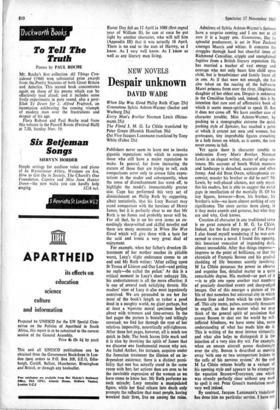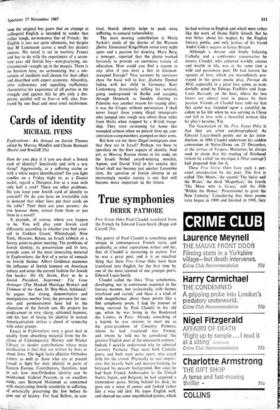NEW NOVELS
Despair unknown
DAVID WADE
When She Was Good Philip Roth (Cape 25s) Greenstone Sylvia Ashton-Warner (Seeker and Warburg 25s) Every Man's Brother Norman Lewis (Heine- mann 25s) The Flood J. M. G. Le Clezio translated by Peter Green (Hamish Hamilton 30s) Qui Vive Jacques Lanzmann translated by Tony White (Faber 25s) Publishers never seem to learn not to invoke gigantic reputations with which to compare those who still have a major reputation to make. In general, far from increasing the stature of those they are trying to sell, such comparisons serve only to arouse false expec- tations in the reader and subsequently, when the sense of disenchantment has worn off, to highlight the model's immeasurably greater size. Cape has performed this very act of diminishment on Philip Roth by suggesting, albeit tentatively, that his Lucy Bassart may stand comparison with the heroines of Henry James, but it is perfectly clear to me that Mr Roth is no James and probably never will be. For all that, he is on his own terms an ex- ceedingly sharp-witted and skilful novelist and there are many moments in When She Was Good which will give those with a taste for the acid and ironic a very great deal of enjoyment.
For example, when her father's drunken ill- treatment of her mother reaches its pitiable worst, Lucy's slight endurance comes to an end and Mr Roth writes: 'After calling upon St Teresa of Lisieux and Our Lord—and getting no reply—she called the police.' As this is a critical moment in Lucy's short unhappy life, his understatement is all the more effective; it is one of several such satisfying thrusts. His readers' view of Lucy is also most ingeniously contrived. We are persuaded to see her for most of the book's length as rather a good deed in a naughty world, no giant perhaps, but at least a vigorous moral specimen hedged about with trimmers and time-servers. In the last pages the picture is brutally and tellingly reversed; we find her through the eyes of her relatives impossibly, neurotically self-righteous. After these last pages, however, all is much too quick to fade. The book leaves little mark and it is also by invoking the spirit of James that we discover one fundamental reason why not. An Isabel Archer, for instance, acquires under the Jamesian treatment the illusion of an in- dependent existence; there is a distinct possi- bility that one has actually stood in the same room with her; her actions then are seen to be the inevitable expression of the woman as we have come to know her. Mr Roth performs no such miracle; Lucy remains a manipulated figure, while her final release into death only prompts the reflection that most people, having wrecked their lives, live on among the ruins. Admirers of Sylvia Ashton-Warner's Spinster have a surprise coming and I am not at all sure it is a happy one. Greenstone, like its splendid predecessor, is set in New Zealand amongst Maoris and whites. It concerns the struggles through hard but cheerful times of Richmond Considine, cripple and unexplained fugitive from a British literary reputation. He has married a teacher of vast energy and courage who not only bears him child upon child, but is breadwinner and family focus all in one. As if that were not enough, she has also taken on the rearing of the half-caste Maori princess from over the river, illegitimate daughter of her eldest son. Despair is unknown in the Considine family and, indeed, this is by intention that rare sort of affirmative book of which it seems mean-spirited to speak ill. But it does not come off. We have another case of character trouble; Miss Ashton-Warner, by pushing to a stenographic extreme the quick probing style of Spinster, has reached a point at which it creates not men and women, but grotesques, tiny improbable figures crouching in a lush forest on which, as it seems, the rain never ceases to fall.
Yet again there is character trouble to undermine Every Man's Brother. Norman Lewis is an elegant writer, master of crisp sen- tences. His account of South Welsh manners and landscape is detached, accurate and often funny. And did Bron Owen, schizophrenic ex- convict, murder his brother or did he not? Mr Lewis, by well-placed silences, not only mysti- fies his readers, but is able to suggest the awful gaps in recollection of the mentally ill. Of his key figures, however—Bron, his brother, his brother's wife—we learn almost nothing of any significance. The story carries them along, in it they make sounds and gestures, but who they are and why, God knows.
Creation of character in any traditional sense is no great concern of J. M. G. Le Clezio. Indeed, for the first forty pages of The Flood I also found myself wondering if he was con. cerned to create a novel. I found this opening, this luxuriant evocation of impending dark, almost unreadable. After that things improve— improve to the point of brilliance, so that the chronicle of Francois Besson and his gradual shedding of life becomes acutely involving. M Le Cldzio possesses the power to observe and organise fine, detailed matter to a quite remarkable degree. His method—or part of it —is to pile one upon another vast numbers of precisely described events and sharp-edged images. Out of this emerges a picture of the life of that nameless but universal city in which Besson lives and from which he cuts himself off. This city teems, pulses, constantly threatens to engulf, so that no matter what we may think of the general spirit of pessimism that causes Besson to shut out the world by self- inflicted blindness, we have some idea, sonic understanding of what has made him do it. This is writing of the most intense virtuosity, and what also helps to distinguish it is the injection of a very nice dry wit. For example, when an unseen aircraft passes deafeningly over the city, Besson is described as moving away 'with one or two unimportant lesions in the cells of his nervous system.' At the end M Le Clezio returns briefly to a variant of his opening style and appears to be attempting the equation Besson=Everyman, one which was already perfectly clear without any need to spell it out. Peter Green's translation reads very well indeed. By contrast, Jacques Lanzmann's translator has done him no particular service. I have not seen the original but guess that an attempt at colloquial English is intended Co render that rather tough, no-nonsense line of French: the English is just not quite idiomatic, but despite that M Lanzmann scores a small but distinct success. His novel is set in wartime France and has to do with the experiences of a seven- teen year old Jewish boy—non-practising, un- circumcised—caught up in the maquis. There is no heroism here, no sermonising, but a suc- cession of incidents well chosen for their effect and described with expert economy. Absurdity, utter callousness and appalling inefficiency characterise his experience of all parties in the struggle and against this he plts" only a des- perate, painful will to live—a will, alas, frus- trated by one final and most cruel misfortune.



































 Previous page
Previous page